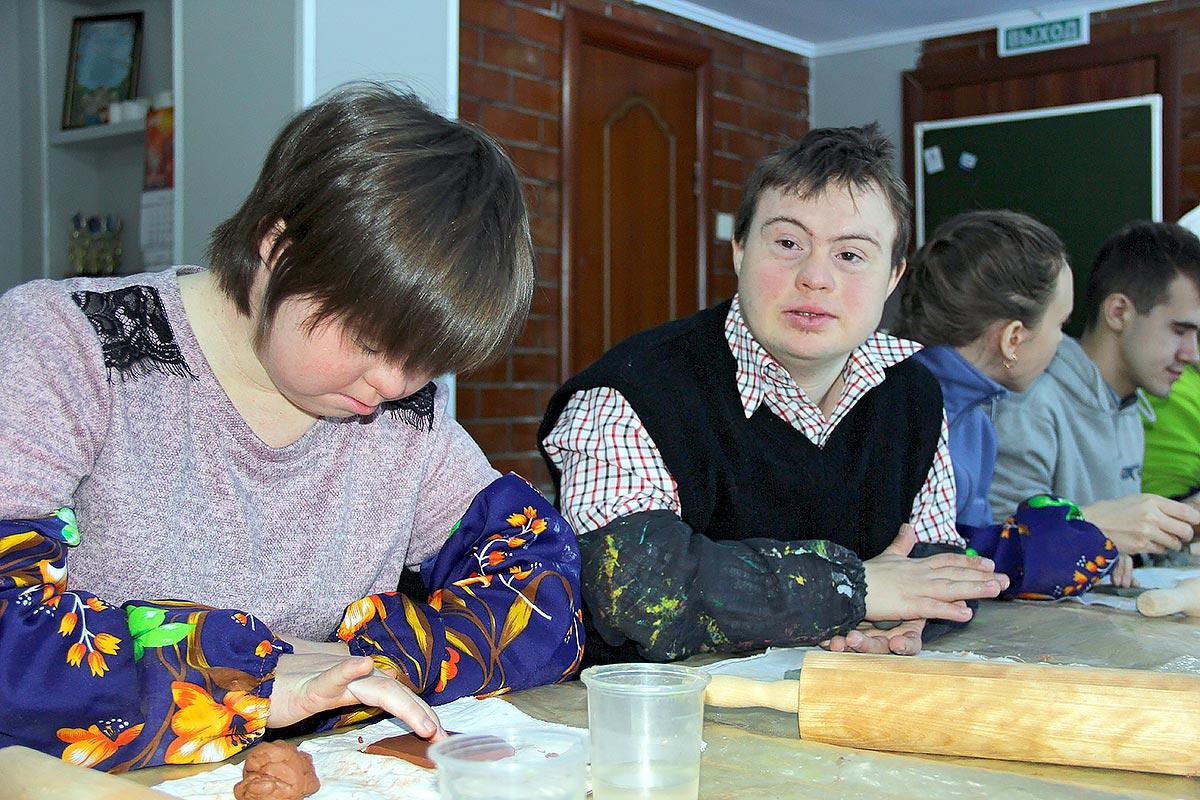Lutherans in Russia assist people with disabilities

Young people with disabilities receive support and therapy, such as painting lessons, by a small Lutheran congregation in Tolyatti, Russia. Photo: Marcus Mockler, epd -Bild
Diaconal initiative brings joy, challenges stereotypes
(LWI) - A small Lutheran congregation in Tolyatti, west Russia, has taken up the challenge of being an inclusive congregation, providing vital support for disabled young adults.
Whether they suffer from Down’s syndrome, epilepsy, cerebral palsy or autism – people with disabilities in Russia face challenges. Many are marginalized. For children and adolescents, schools and homes are available – yet when they finish education, many have to do without work or therapy programs.
“Then they sit at home and are mentally and physically inactive,” says Superintendent Olga Temirbulatova, a Lutheran pastor from Samara, who is concerned about this lack of services. Almost always it is the mothers who care for their adult children full-time.
Small beginnings of an inclusive congregation
In Tolyatti, a city on the Volga with 700,000 inhabitants, a Lutheran congregation of the Evangelical Lutheran Church in European Russia acquired a two-story building and opened a center to support these young adults. About 15 children and young adults with disabilities come to the center from Tuesday to Friday.
Pastor Tatjana Zhivoderova, who leads activities at the center, not only studied theology but also teaches dancing. On a typical day, the young adults at the center dance together, visibly enjoying themselves. An art teacher comes to give classes in painting and clay modeling. On Tuesdays everyone goes to therapeutic swimming at the indoor swimming pool.
At first, many of the people living near the parish center reacted negatively to the group. Parents were worried their children could “catch” a disability, Pastor Zhivoderova remembers. Since then, however, the group has appeared in public so often that the residents of this part of Tolyatti are used to them, which has in turn reduced prejudice.
Respect for the Lutheran service to the common good
The services provided are a help not only to the people with disabilities but also to their next of kin. They come together in the community center, share ideas and support each other. This is an opportunity take a break for an hour or two – it is challenging for parents to be available around the clock for their children. The children and young people, in their turn, develop other relationships and make friends beyond their own families.
This is an expression of the churches’ calling to support people in need and pay special attention to those who are most vulnerable.
Besides their contribution to inclusion, the Lutherans see another advantage. In a society in which the Russian Orthodox Church is predominant, this social commitment brings recognition to the small Lutheran minority.
LWF Area Secretary for Europe, Rev. Dr Ireneusz Lukas, says this is an expression of the churches’ calling to “support people in need and pay special attention to those who are most vulnerable, like those person with disabilities in Tolyatti. The mission of the church should also be diaconical.”
“Hope for Eastern Europe” runs its 25th campaign
In Wurttemberg, Germany, it is a tradition for Lutheran parishes to dedicate their collections from well-attended Good Friday services to the appeal, Hope for Eastern Europe. This year marks the 25th appeal. Last year, it supported diaconal projects in the Slovak Republic, Serbia, Romania, the Russian Federation and other countries with the sum of EUR 266,000. The project in Tolyatti is one of those supported.
Area Secretary Lukas appreciates the initiatives between individual churches of the Lutheran communion. “The role of the LWF lies not only in strengthening multilateral relations, but also in building partner relations between individual churches. The direct help of Christians in Germany for those in need in Russia is a manifestation of Christian love above all existing divisions.”
Based on a story by Marcus Mockler, Evangelischer Pressedienst, Germany. Translated and edited by the LWF Office for Communication Services.





